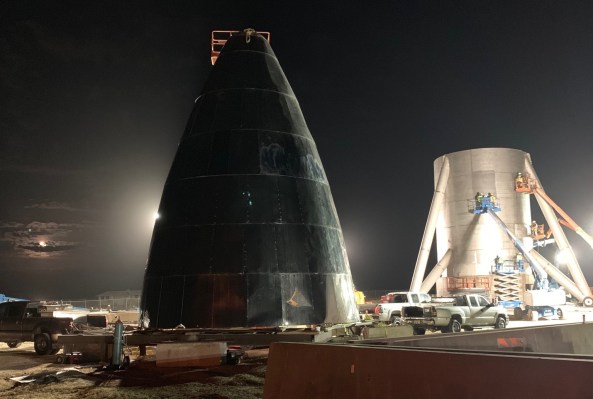
SpaceX’s futuristic Starship interplanetary craft may embody the golden age of sci-fi in more ways than one: in addition to (theoretically) taking passengers from planet to planet, it may sport a shiny stainless steel skin that makes it look like the pulp covers of old.
Founder and CEO Elon Musk teased the possibility in a picture posted to Twitter, captioned simply “Stainless Steel Starship.” To be clear, this isn’t a full-on spacecraft, just part of a test vehicle that the company plans to use during the short “hopper” flights in 2019 to evaluate various systems.
As with most Musk tweets, this kicked off a storm of speculation and argument in the Twitterverse.
The choice surprised many because for years, modern spaceflight has been dependent on advanced composite materials like carbon fiber, which combine desirable physical properties with low weight. When metal has been required, aluminum or titanium are much more common. While some launch components, like the upper stage of the Atlas 5 rocket, have liberally used steel, it’s definitely not an obvious choice for a craft like the Starship, which will have to deal with both deep space and repeated reentry.
As Musk pointed out in subsequent comments, however, stainless steel has some advantages versus other materials when at extremely hot or cold temperatures.
This is a special full-hardness steel alloy mentioned as being among the 300 series of high-strength, heat-resistant alloys — not the plentiful, pliable stuff we all have in our kitchens and buildings. Musk also mentioned another “superalloy” called SX500 that SpaceX’s metallurgists have developed for use in the Raptor engines that will power the vehicle.
So why stainless? It’s likely all about reentry.
Many craft and reusable stages that have to face the heat of entering the atmosphere at high speed use “ablative” heat shielding that disintegrates or breaks away in a controlled fashion, carrying heat away from the vehicle.
It’s unlikely this is a possibility for Starship, however, as replacing and repairing this material would necessitate downtime and crews wherever and whenever it lands, and the craft is meant to be (eventually) a quick-turnaround ship with maximum reusability. Heat shielding that reflects and survives is a better bet for that — but an enormous engineering problem.
Scott Manley put together a nice video illustrating some of these ideas and speculations in detail:
Musk said before of the Starship (then still called BFR) that “almost the entire time it is reentering, it’s just trying to brake, while distributing that force over the most area possible.” Reentry will probably look more like a Space Shuttle-esque glide than a Falcon 9 first stage’s ballistic descent and engine braking.
The switch to stainless steel has the pleasant side effect of making the craft look really cool — more in line with sci-fi books and comics than their readers perhaps ever thought to hope. Paint jobs would burn right off, Musk said:
You can’t expect it to stay shiny for long, though; it may be stainless, but like a pan you left on the stove, stainless steel can still scorch and the bottom of the Starship will likely look pretty rough after a while. It’s all right — spacecraft developing a patina is a charming evolution.
Details are still few, and for all we know SpaceX could redesign the craft again based on how tests go. Next year will see the earliest hopper flights for Starship hardware and possibly the Super Heavy lower stage that will lift its great shiny bulk out of the lower atmosphere.
The technical documentation promised by Musk should arrive in March or April, but whether it will pertain solely to the test vehicle or give a glimpse at the craft SpaceX intends to send around the moon is anyone’s guess. At any rate you should expect more information to be spontaneously revealed before then at Musk’s discretion — or lack thereof.
Be the first to comment